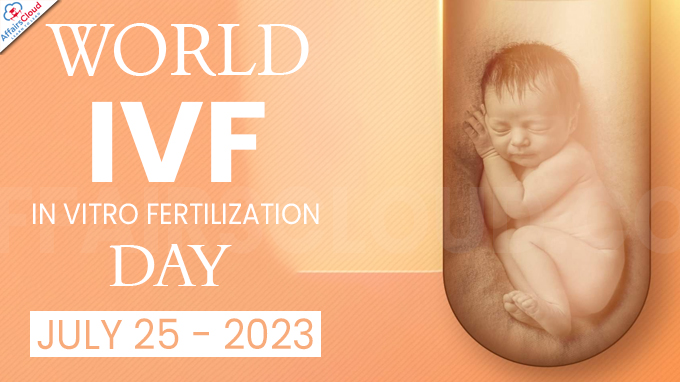
World In Vitro Fertilization (IVF) Day is annually observed across the globe on 25th July to commemorate the achievements and progress made in the field of infertility and reproductive endocrinology.
- The day 25th July marks the birth date of world’s first ‘Test-tube baby’, Louise Brown, the first baby conceived via in vitro fertilization (IVF). Louise Brown was born on 25th July 1978 in in Manchester, England, the United Kingdom (UK).
Significance:
i.This day is also recognised to celebrate the success and importance of IVF as an effective method of conceiving.
ii.This day is also known as World Embryologist Day observed across the globe to commemorate the great role and contribution of Embryologists in the IVF technology, one of the greatest innovations in the field of reproductive Science.
Note: Robert Edwards (“Father of IVF”), a Scientist and a Nobel Prize (Physiology or Medicine 2010) winner for the development of human IVF therapy and Patrick Steptoe, Gynaecologist surgeon from the UK are the successful pioneers of IVF in the world.
About In Vitro Fertilization (IVF):
i.IVF is a type of Assisted Reproductive Technology (ART) where sperm and an egg are fertilized outside of the human body.
ii.IVF is a complex process that involves retrieving eggs from ovaries and manually combining them with sperm in a lab for fertilization.
iii.Several days after fertilization, the fertilized egg (now called an embryo) is placed inside a uterus. Pregnancy occurs when this embryo implants itself into the uterine wall.
About Assisted reproductive technologies (ART):
i.ART refers to a range of techniques used to achieve pregnancy by handling sperm or egg cells outside the human body and transferring embryos into the woman’s reproductive tract.
ii.Types of ART techniques include IVF, Intracytoplasmic sperm injection, Artificial insemination, Egg donation, Ovarian stimulation and so on.
Regulations on ART:
i.The Assisted Reproductive Technology (Regulation) Bill, 2020 was introduced in Lok Sabha in September 2020 to protect and safeguard the reproductive rights of women.
ii.The Parliament on December 2021, passed the Assisted Reproductive Technology (Regulation) Act, 2021 aims at the regulation and supervision of ART clinics and banks, prevention of misuse, and safe and ethical practice of ART services.
iii.On 7th June 2022, The Ministry of Health and Family Welfare published the Assisted Reproductive Technology (Regulation) Rules, 2022 to regulate the functioning of ART clinics and banks.
iv.In 2023, The Ministry of Health and Family Welfare introduced the Assisted Reproductive Technology Regulations (ART), 2023 aiming to improve medical care and security for donors and patients.
v.In order to regulate and supervise the ART clinics, the Indian Council of Medical Research (ICMR) and National Academy of Medical Sciences (NAMS) have come out with National Guidelines for Accreditation, Supervision and Regulation of ART Clinics in India.
First Indian Test Tube Baby:
i.The first Indian test tube baby, ‘Kanupriya Agarwal’ aka Durga who was born on October 3, 1978.
ii.Late Dr Subhash Mukhopadhyay was the first-ever physician in India and the second in the world to create a baby through the IVF procedure.